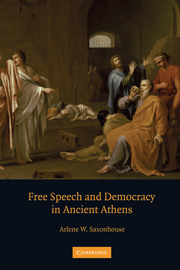Prologue: Four Stories
Published online by Cambridge University Press: 06 January 2010
Summary
THE FIRST: THERSITES
In the second book of Homer's Iliad a character named Thersites appears. According to Homer, Thersites was “the ugliest soldier at the siege of Troy/ Bowlegged, walked with a limp, his shoulders/ Slumped over his caved in chest, and up top/ Scraggly fuzz sprouted on his pointy head.” Homer continues the insults: Thersites was “a blathering fool/ And a rabble rouser, [who] had a repertory/ Of choice insults he used at random to revile the nobles,” and yet this blathering fool with a pointy head steps into the circle of kings who are deliberating about whether to end their siege of Troy. There Thersites states his views and the words Homer gives to this rabble rouser are not at all those of a blathering fool. Instead, in many instances, he repeats the speech Achilles gave in Book 1: Agamemnon is greedy, he does not appreciate the energy and ability of Achilles or of the men who fight for him. Yet, this Thersites who has spoken truth to power is an intruder into the Assembly of the deliberating kings. For this, Odysseus “was on him in a flash… .: ‘Mind your tongue, Thersites. Better think twice/ About being the only man here to quarrel with his betters. I don't care how bell-toned an orator you are,/ You're nothing but trash.’” Odysseus strikes Thersites, leaving bloody welts on his back and tears in his eyes (2.212–77). Obviously, Thersites was not allowed to speak freely.
- Type
- Chapter
- Information
- Free Speech and Democracy in Ancient Athens , pp. 1 - 10Publisher: Cambridge University PressPrint publication year: 2005

